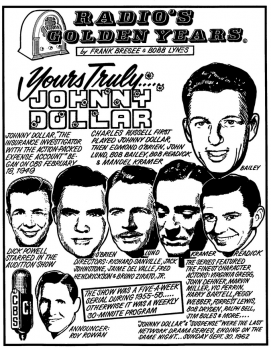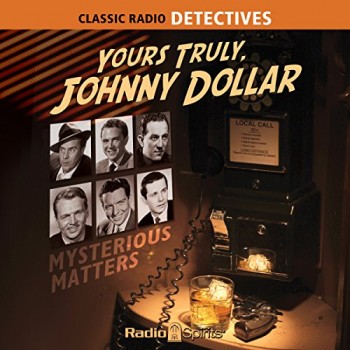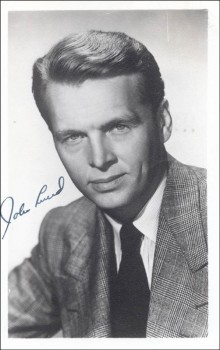A (Black) Gat in the Hand: YTJD – The Emily Braddock Matter (John Lund)
“You’re the second guy I’ve met within hours who seems to think a gat in the hand means a world by the tail.” – Phillip Marlowe in Raymond Chandler’s The Big Sleep
(Gat — Prohibition Era term for a gun. Shortened version of Gatling Gun)
Yours Truly, Johnny Dollar, was a very popular radio show that ran from 1949 – 1962. Dollar was a free-lance insurance investigator – maybe the best in the business — who traveled all over the United States and beyond, to help insurance companies stay on the right side of the financial ledger. He’s famous for fully expensing his trips: claiming ten cents for an aspirin for a job-induced headache is standard. Each episode opens with some company hiring him to look into a claim on their behalf. He usually has a quip early on (“Hi Johnny, are you free?” “Available, yes. Free, no.”), and then travels to the scene of the affair.
Dick Powell recorded the first audition for the part, but passed on the show to make Richard Diamond, Private Eye (a show I thoroughly enjoy). Charles Russell (Inner Sanctum) became the first Dollar, succeed not long after by Edmond O’Brien (White HeatThe Wild Bunch), and then John Lund (Foreign Affair, High Society). Bob Bailey had the longest, and most successful, run. When the show moved from Hollywood to New York, he quit to remain on the West coast. Robert Readick (his career spanned over five decades in radio) took over in New York, and finally, it was Mandel Kramer (The Edge of Night). Today, we’ll look at a John Lund episode.
One of the Lund episodes which I really like, because it has a Raymond Chandler feel to it, is The Emily Braddock Matter, which aired on May 19, 1953. You can listen to the episode here: scroll down to number 24.
A woman is passing bad checks out on the West coast, and the Baltimore Liability insurance company calls on Dollar to fly out to California to stop her. She’s hit three of their covered hotels. Of course, Philip Marlowe – and his prototypes, such as Johnny Dalmas – operated out of southern California, with the fictional Bay City being Santa Barbara. But Dollar has cases all over the world, so that wasn’t really a Chandler trigger.
“Expense account item one, $158.16; Plane fare and incidentals, Hartford to Santa Barbara.” And off we go!
His local police contact is out, so Dollar heads to the Harbor Inn, where Glenn Sheridan is the hotel operator who had been taken in by the crook. He has twenty years experience in the business, but said she was the best he’s seen. She bluffed her way through a four-day stay, giving Sheridan a forged check for $813 when she left. She had been well dressed, with fancy luggage (which she probably bought with a forged check), spending big money in the dining room every evening. She totally fooled him.
Sheridan had checked her name and home address, finding her listed in Beverly Hills. But he discovered too late that the real person of that name was on vacation in Europe. Checking in with the police, Dollar finds that a woman fitting her description had passed bad checks in Burlingame, Santa Maria, and Ohai. She was a very good grifter.
“Expense account item two, $114.85; transportation to Monterey and Santa Cruz.” He talks to the other two clients and hears the same story from them.
“Expense account item three, $4.15; long distance phone call.”
Ray, his Baltimore Liability employer, tells him she just did it again in Malibu Beach, kiting a check at the Sea Side Inn. The manager found out it was bad fifteen minutes after she left that morning, so it’s a hot lead. Dollar is on the trail!
Expense account item four, $38 even; Transportation, Santa Barbara to Malibu.”
 Knowing the story, Dollar doesn’t even bother to talk to the hotel man. Instead, he goes to see Sergeant Pells at the Sheriff’s Office. A part of the usual pattern is for Dollar to check in with the police at the start of a case. Which he did here, though his designated contact was out. So, we get the police interaction starting a little later than normal.
Knowing the story, Dollar doesn’t even bother to talk to the hotel man. Instead, he goes to see Sergeant Pells at the Sheriff’s Office. A part of the usual pattern is for Dollar to check in with the police at the start of a case. Which he did here, though his designated contact was out. So, we get the police interaction starting a little later than normal.
The local police sometimes aren’t thrilled with the out-of-town insurance guy getting involved in things, but that’s not the norm. Dollar works with the local authorities if they seem honest. He doesn’t hold things back like Sam Spade, and he’s usually sincere in his dealings with them. He doesn’t simply rely on them, though. He does his own investigating. And he sometimes carries a gun, which he is willing to use.
Anywhoo…Pells has a lead! Using the name Ellen Bradley, she had spent time with a local under-employed, pretty boy actor, named Tony Garland. He drove her into town just that morning.
Pells and Dollar go out to Garland’s place, where they find him sitting in front of the house, tanning his muscular body. This was when I started thinking about Chandler. Garland seems like a weekend-rental version of Chris Lavery from The Lady in the Lake. Things work out better for him than they did for Lavery, but he seems like the same kind of character. Just out more for fun, than money.
They let him know she’s a con artist. About three hours before, he had driven her to a hotel in Los Angeles, where she dumped her fourteen pieces of luggage. After making a phone call, she told him she had a meeting with a lawyer at a bar in town, and he dropped her off there.
He still believes her woeful story that her two-year old boy had been killed in an automobile accident, which wrecked her marriage. He figured she was just having a fling, and he was willing to help.
We see an element of Chandler’s cynicism when Garland tells Dollar he should try believing people sometimes. The insurance man replies that he will, the next time he’s got two weeks off. That’s what you call a vacation. There’s no giving the benefit of the doubt in his job. It’s not Marlowe’s world-weary cynicism, caused by disappointment in human nature. Dollar just knows, when investigating insurance fraud, trusting people is a good way to blow the job. Fraud is built on deception.
Dollar and Pells go to the bar and find that Bradley had never been there: Garland’s story has a hole in it. The big break comes the following morning, when the police get a fingerprint match. Her real name is Emily Braddock, and her sister, Elaine, lives in Los Angeles. Dollar goes to visit Elaine on his own. She is a gray-haired woman in a wheelchair, in a bad neighborhood. Life has not been generous to her.
Emily had visited the day before, trying to borrow money. Elaine says her sister is no good, and she didn’t lend her any money. Emily had done two years of jail time, and failed in her promise to take care of Elaine after she got injured ten years ago.
 She hates her sister, but she still tells Dollar that, even if she killed someone, she hopes Emily doesn’t get caught. Ten years in prison would ruin Emily’s life. Emily is a grifter with the ability to win over anyone; even those who don’t like her. She’s not exactly a femme fatale, but she’s a tough as nails con-woman who has no remorse for her crimes, as we’ll see shortly.
She hates her sister, but she still tells Dollar that, even if she killed someone, she hopes Emily doesn’t get caught. Ten years in prison would ruin Emily’s life. Emily is a grifter with the ability to win over anyone; even those who don’t like her. She’s not exactly a femme fatale, but she’s a tough as nails con-woman who has no remorse for her crimes, as we’ll see shortly.
Dollar gets a newly-acquired mug shot of Emily from the sheriff’s office and goes to visit Garland again. He explains that her story about the son was a lie, since the timeline shows she would have had to have been in prison when it happened. Dollar says it was a baby (before, it was a two-year old boy). I think it’s a little loose, but the idea is the timing of her two-year jail term proves the whole story is false.
He tells Garland he’s talked to eight men she’s fooled, and the sister, who knows who she really is, and he can see understand how she wins people over. But he also tells Garland she’s going to keep doing this if he doesn’t help catch her. Eventually, she’ll get caught, but she’ll hurt more people along the way. He talks to Garland not as a victim of her check-forging, but as her boyfriend. The next sentence is one of my favorite lines in the story.
“True, just a four-day boyfriend. And a woman like that can do a lot of damage in just four days time.”
Dollar bores in, channeling his inner Philip Marlowe, telling Garland that she’s “a crook, a thief, and a forger, and that everything she ever told you is a lie. Now and then, a woman walks into a man’s life that he’d sell his soul for, but don’t ever do any business along those lines with this baby, because all she’ll do is give you a bad check for it. She’s trouble in a great big way, and you know it as well as I do.”
Dollar sounds a lot like the typical hardboiled private eyes in that speech. It works, as he convinces Garland to tell him that he took her to a hotel in Santa Monica, registered as Evelyn Brady. Garland doesn’t want Dollar to let her know he turned her in. Just an hour before, he and Emily had said on the phone that they loved each other. He has a hard time believing she’s not just an attractive woman that fell for him.
He calls Pells and twenty minutes later they are at Bradford’s door. Dollar admits he’s been shaken up a bit. There are worse crimes, but the way people were so fooled by her, and the effect she had on them, affected him. He tells Pells it’s too bad she’s a criminal. She denies their accusation, and they take her downtown.
She refuses to admit anything related to the sixteen counts filed against her. And when she asks to see Dollar before he leaves, we really see what a hard-edged cookie she is. She wants Dollar to admit that Garland turned her in. He replies, “I thought you wanted to tell me something.”
“You thought wrong. The same as all these others around here. I’m not going to tell you, or anybody else, anything. Police are like hotel men. You figure out their system, and then you beat it.”
“If you say so.”
She says they could have had a drink and been friends, if they’d met under different circumstances. She knows Dollar got Garland to talk about her, but she wants to know how he did it. It’s not such a big thing to let her know. She’s persistent. It’s like she wants to know for future reference.
“I told him just what you are: A thief, a crook.”
“That sold him?” she asks, surprised.
“Well, he told me where to find you.”
“I guess it did. Huh. I must be slipping.”
“You slipped a long time ago. When you walked out on that sister of yours. When you thought you could talk and look your way into anything you wanted.”
“I didn’t know I thought that, but if you say so. Whatever I’ve got, it worked.”
“Has it? Two years the last time. Whatever you get this time will be longer. No matter what you say, or don’t say.”
She is defiant. “I’m not in a courtroom yet. That’s where it happens, not in a lousy jail. We’ll see about that.
“You’re just as bad, and just as dumb, as the worst of them.”
“Any day you believe that,” she says scornfully. Then, almost mockingly, “Like it says in the manual, when a woman suspect is to be interrogated, remember that the strongest appeal to her is in her family connections and moral outlook. Question her regarding this.”
Then, her tone finally seems to break, and there’s a sense that she is frustrated, not totally in command. “Stinking cops. Just stinkin’ cops. You never give up, do you?”
“Hardly ever.”
Then, like a quiet curse, “Stinkin’ cop.”
And we’re done with Emily Braddock. It’s time to wrap up the expense report: I mean, case.
“Expense account item five; Miscellaneous, $265.”
“Item six, same as item one; transportation back to Hartford.
“Expense account total, $738.32.”
And of course, he signs off with the signature line, which gives the show its title,“Yours Truly, Johnny Dollar.”
Some episodes feature a more typical hardboiled approach than others. For me, Bob Bailey really broke the mold and created a rather unique portrayal of Dollar, differentiating him from the competing radio shows of the time. But of the first three Dollars, Lund has become my second-favorite. And while he seemed to be of the more common hardboiled type after taking the role over from O’Brien, it became a bit more distinctive over time, setting the stage for Bailey.
Prior posts in A (Black) Gat in the Hand – 2020 Series (10)
A (Black) Gat in the Hand: Hardboiled May on TCM
A (Black) Gat in the Hand: Some Hardboiled streaming options
A (Black) Gat in the Hand: Johnny O’Clock (Dick Powell)
A (Black) Gat in the Hand: Hardboiled June on TCM
A (Black) Gat in the Hand: Bullets or Ballots (Humphrey Bogart)
A (Black) Gat in the Hand: Phililp Marlowe – Private Eye (Powers Boothe)
A (Black) Gat in the Hand: Cool and Lam
A (Black) Gat in the Hand: All Through the Night (Bogart)
A (Black) Gat in the Hand: Dick Powell as Yours Truly, Johnny Dollar
A (Black) Gat in the Hand: Hardboiled July on TCM
A (Black) Gat in the Hand – 2019 Series (15)
Back Deck Pulp Returns
A (Black) Gat in the Hand Returns
A (Black) Gat in the Hand: Will Murray on Doc Savage
A (Black) Gat in the Hand: Hugh B. Cave’s Peter Kane
A (Black) Gat in the Hand: Paul Bishop on Lance Spearman
A (Black) Gat in the Hand: A Man Called Spade
A (Black) Gat in the Hand: Hard Boiled Holmes
A (Black) Gat in the Hand: Duane Spurlock on T.T. Flynn
A (Black) Gat in the Hand: Andrew Salmon on Montreal Noir
A (Black) Gat in the Hand: Frank Schildiner on The Bad Guys of Pulp
A (Black) Gat in the Hand: Steve Scott on John D. MacDonald’s ‘Park Falkner’
A (Black) Gat in the Hand: William Patrick Murray on The Spider
A (Black) Gat in the Hand: John D. MacDonald & Mickey Spillane
A (Black Gat in the Hand: Norbert Davis goes West(ern)
A (Black) Gat in the Hand: Bill Crider on The Brass Cupcake
A (Black) Gat in the Hand – 2018 Series (31)
With a (Black) Gat: George Harmon Coxe
With a (Black) Gat: Raoul Whitfield
With a (Black) Gat: Some Hard Boiled Anthologies
With a (Black) Gat: Frederick Nebel’s Donahue
A (Black) Gat in the Hand: Thomas Walsh
A (Black) Gat in the Hand: Black Mask – January, 1935
A (Black) Gat in the hand: Norbert Davis’ Ben Shaley
A (Black) Gat in the Hand: D.L. Champion’s Rex Sackler
A (Black) Gat in the Hand: Dime Detective – August, 1939
A (Black) Gat in the Hand: Back Deck Pulp #1
A (Black) Gat in the Hand: W.T. Ballard’s Bill Lennox
A (Black) Gat in the Hand: Day Keene
A (Black) Gat in the Hand: Black Mask – October, 1933
A (Black) Gat in the Hand: Back Deck Pulp #2
A (Black) Gat in the Hand: Black Mask – Spring, 2017
A (Black) Gat in the Hand: Frank Schildiner’s ‘Max Allen Collins & The Hard Boiled Hero’
A (Black) Gat in the Hand: William Campbell Gault
A (Black) Gat in the Hand: More Cool & Lam From Hard Case Crime
A (Black) Gat in the Hand: MORE Cool & Lam!!!!
A (Black) Gat in the Hand: Thomas Parker’s ‘They Shoot Horses, Don’t They?’
A (Black) Gat in the Hand: Joe Bonadonna’s ‘Hardboiled Film Noir’ (Part One)
A (Black) Gat in the Hand: Joe Bonadonna’s ‘Hardboiled Film Noir’ (Part Two)
A (Black) Gat in the Hand: William Patrick Maynard’s ‘The Yellow Peril’
A (Black) Gat in the Hand: Andrew P Salmon’s ‘Frederick C. Davis’
A (Black) Gat in the Hand: Rory Gallagher’s ‘Continental Op’
A (Black) Gat in the Hand: Back Deck Pulp #3
A (Black) Gat in the Hand: Back Deck Pulp #4
A (Black) Gat in the Hand: Back Deck Pulp #5
A (Black) Gat in the Hand: Joe ‘Cap’ Shaw on Writing
A (Black) Gat in Hand: Back Deck Pulp #6
A (Black) Gat in the Hand: The Black Mask Dinner
 Bob Byrne’s ‘A (Black) Gat in the Hand’ was a regular Monday morning hardboiled pulp column from May through December, 2018 and again from August through December, 2019.
Bob Byrne’s ‘A (Black) Gat in the Hand’ was a regular Monday morning hardboiled pulp column from May through December, 2018 and again from August through December, 2019.
His ‘The Public Life of Sherlock Holmes’ column ran every Monday morning at Black Gate from March, 2014 through March, 2017 (still making an occasional return appearance!).
He organized ‘Hither Came Conan,’ as well as Black Gate’s award-nominated ‘Discovering Robert E. Howard’ series.
He is a member of the Praed Street Irregulars, founded www.SolarPons.com (the only website dedicated to the ‘Sherlock Holmes of Praed Street’) and blogs about Holmes and other mystery matters at Almost Holmes.
He has contributed stories to The MX Book of New Sherlock Holmes Stories – Parts III, IV, V, VI and XXI.
